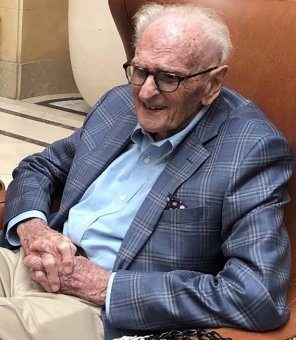Stanford economics professor John G. Gurley dies
A leader in the study of Maoist and Marxist economic policies, Gurley had a large impact on students.
John G. Gurley, emeritus professor of economics in the School of Humanities and Sciences, died November 15 at his home in Palo Alto. He was 100.
“Those of us who were fortunate to overlap with Jack during his long Stanford career remember him as a wonderful colleague and inspirational teacher who enriched the lives of all members of our community, and as an exceptional scholar who encouraged us to reconsider our assumptions about economic systems,” said B. Douglas Bernheim, Trione Chair of the Department of Economics and Edward Ames Edmonds Professor.
Gurley, who had a long history at Stanford, was known for his work in economic systems, Marxian theory, and Soviet and Chinese economics.
He began his Stanford career as an undergraduate earning his degree in 1943 and then staying on to complete his doctorate in 1951. He served as an instructor in the economics department from 1948–50 while he was a graduate student.
Upon completion of his degree, Gurley moved to Princeton University as an assistant professor and then to the University of Maryland. Gurley returned to Stanford in 1961, where he worked with his economics department colleague Edward Shaw, to write a book and articles on integrating money, finance, and economic growth.
“These articles, which included an analysis of broader financial intermediaries as well as banks, received a lot of attention and were considered by many as ahead of their time,” wrote John B. Shoven, former Trione Director of SIEPR and the Charles R. Schwab Professor of Economics, Emeritus, in a tribute to his colleague.
Later in his career, Gurley shifted his research to focus on the Chinese and Soviet economies as well as Marxian economics, which he explored as counterpoints to capitalism. He was a critical thinker about the pros and cons of different economic systems, according to Shoven.
“Jack encouraged Stanford students to think big and to endeavor to make the world fairer and more equitable. He not only wrote a book entitled Challengers to Capitalism: Marx, Lenin, Stalin and Mao, but he also wrote another book entitled Challenges to Communism,” Shoven wrote.
From 1963 to 1968, Gurley served as managing editor of the American Economic Review, the leading journal in the field of economics. He was a fellow at the Center for Advanced Study in the Behavioral Sciences from 1966-67. In 1976, he gave the prestigious Marshall Lectures at the University of Cambridge.
A former student, Lawrence J. Lau, Ralph and Claire Landau Professor of Economics at the Chinese University of Hong Kong, remembered that Gurley visited Communist China long before it was open to most visitors. Lau noted Gurley’s emphasis on how a society’s superstructure—culture, ideology, and institutions—can affect the economy and the relationship between capitalists and workers.
“Jack was a person of great integrity and principles,” Lau said. “I still remember he actually spent a few days in jail for participating in an anti-Vietnam war demonstration in Oakland, and he gave economics lectures to the fellow demonstrators in the prison.”
In 1971, Gurley was one of the first recipients of Stanford’s Walter J. Gores Award for Excellence in Teaching. His Economics 1 class was incredibly popular, attracting a record enrollment for a class at Stanford with 664 students in 1975, according to Shoven. Gurley retired from Stanford in 1987 but was still called upon to teach Economics 1 from time to time.
As a freshman, Lau was a student in Gurley’s Economics 1 course. “He was indeed a fantastic teacher,” Lau said. “He opened my eyes to the internal logic and wide applicability of economics. He convinced me, an undergraduate major in physics at the time, to take a second major in economics. If it were not for Jack’s course, I would probably still be chasing neutrinos.”
Gurley was born in Alameda, California, and as a Stanford undergraduate, he was a member of the 1942 tennis team, helping to win national championships in both men’s singles and doubles.
Gurley and his late wife Yvette, also an economist, were married for 69 years. In their later years, the couple moved to the Vi at Palo Alto. Gurley chronicled the last 32 months of Yvette’s life as she struggled with Alzheimer’s disease in a series of short, poignant books, one of which is titled Vignettes of Yvette at Vi: A Love Story of a Husband for His Wife.




